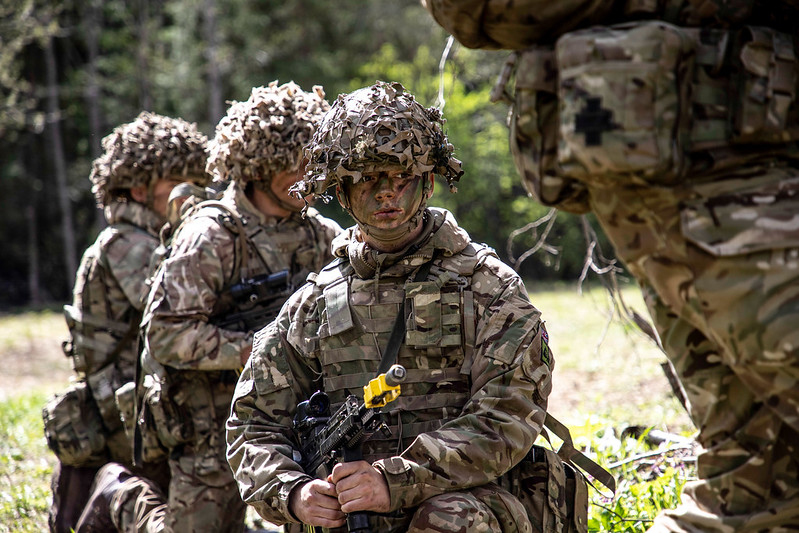
The rise of the military threat is no secret. With the Russia-Ukraine war present in the news every day for the last couple of years, war feels ever more imminent. With this threat comes increased concern for Britain’s defence. Is Britain ready for war?
Senior army officer, General Patrick Sanders recently suggested that Britain is poorly prepared for a potential attack. Specifically, he proposed a ‘citizen army’ with basic training, to be used if necessary in times of war. Sanders points to the diminishing levels of troops and money invested in UK defence. In a gloomy premonition, Sanders describes the UK as a ‘pre-war generation’ that must be ready for war.
Sanders’ remarks triggered a debate on conscription. Rishi Sunak has ruled out this possibility, and a spokesperson for the Prime Minister also suggested that such speculation of hypothetical scenarios is unhelpful. Unfortunately, some speculation seems valid given the threat of conflict is at it’s highest level since the Cold War, yet the UK’s defense spending sits at only 2.2 per cent of GDP (2021), compared with 8 per cent of GDP in the 1950s.
The global landscape bodes of a threat drawing closer. According to some officials, the UK is on the brink of conflict. Even within Europe now, the threat is being taken more seriously with Sweden encouraging the public to join a voluntary defense organisation. If we accept the threat as significant and warranting further defence, then we must consider: how should this further defence be implemented? And secondly, is there public support for this?
It ought to be considered, that the nature of war has evolved. This forms the basis of Defense Secretary, Grant Shapps’, argument. Shapps states that a policy of mutually assured destruction is not enough and the adversaries we face are now interconnected. In addition, we must also be alert to the risk of a cyber war which could potentially collapse vital infrastructure, bringing the UK to a halt. According to Shapps, Britain must focus on modernisation of equipment and deterrent, rather than the quantity of troops.
On the other hand, a more significant army could only be helpful to UK defence. When the British army stood at 100,000 it struggled to secure Basra, an Iraqi city, which is not promising in the face of a potentially much greater threat.
Sanders’ belief that troops are still vital to UK defence must also be evaluated in light of whether citizens are willing to participate in this training. Military personnel have been on the decline in recent years, there have been countless cases of sexual harassment towards female officers, reports of poor accommodation, stagnant pay compared to inflation, lower levels of patriotism, an increased awareness of mental health implications, and an ambiguous ethical record in relation to foreign conflict. Are Brits really willing to fight for their country?
Are Brits really willing to fight for their country?
Despite campaigns deliberately targeting ‘gen z’, the army has been in decline. The campaign has addressed and appealed to the ‘Snowflakes’, ‘binge gamers’, ‘phone zombies’. Some find this approach accusatory, and others viewing it as a sign that the army is open to different sorts of people. In 2023, however, there was a ‘negative net flow of personnel, meaning more people left the force than joined it.’
On a cultural level, Britain has become less patriotic. In the world war era there was a high level of national pride and a defensive instinct, likely a product of the significant threat faced. In recent years, however, the UK has been embroiled in ethically murky conflicts which calls into question how justified UK involvement is. The heightened anti-colonial sentiment has also created a disinclination towards foreign involvement, especially in the younger generation. According to a YouGov poll, patriotism currently sits at an all-time low of only 32 per cent feeling ‘very patriotic’. This cultural shift has been reinforced by the conflicts in Afghanistan and Iraq, which did not secure a clear positive outcome.
The military as a profession has become less appealing since the greater transparency over living conditions, harassment and long term health implications. The rise of literature on Post Traumatic Stress Disorder following military service has increased with prolific writers like Simon Armitage exposing the reality of trauma, and deconstructing heroic war propaganda. This unappealing prospect is increased for women. Despite women accounting for only 11.5 per cent of the total trained strength in 2023, nearly two thirds of this amount report ‘unacceptable behaviour’, including sexual abuse. Many members of the army have also cited the poor accommodation and pay as reasons for leaving.
On a pragmatic level, increased defence spending would inevitably come at a cost to other areas of public expenditure. Since the 1950s, while defense spending has decreased, health spending has experienced significant increase. This, and other public services, would be compromised if defence became a greater priority again. With a Labour government probable, Keir Starmer must consider the compromises he is willing to make. The Labour Party manifesto promises a commitment to NATO, a focus on strategy and a pledge to tackle accommodation. In order to really rebuild Britain’s military strength, whichever party is in power, they will have to create a sense of pride to motivate action.
Whichever party is in power, they will have to create a sense of pride to motivate action.
Increasingly, defence becomes ever more important to the UK. While reforming pay, accommodation, and military culture, the government also faces the task of presenting a strong justification for military strength. In order for Britain to be ready for war, there must be a united front, and this begins with an unshakeable purpose behind their defence.


